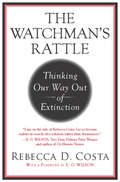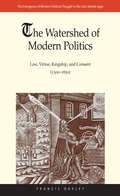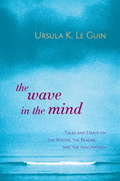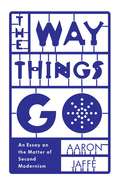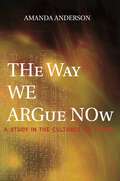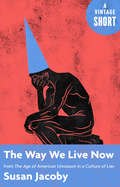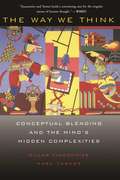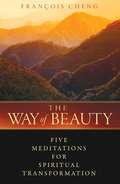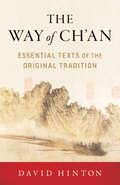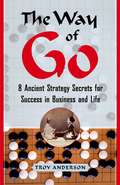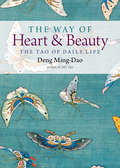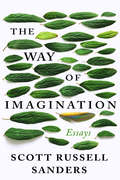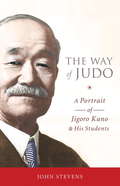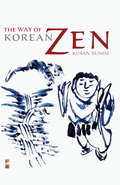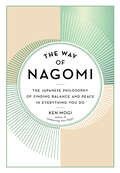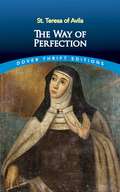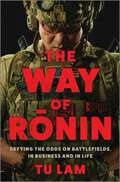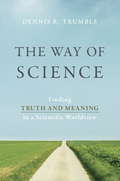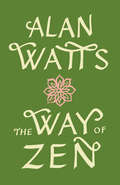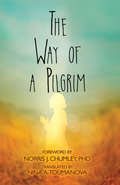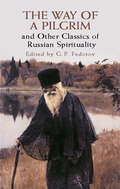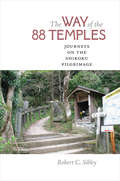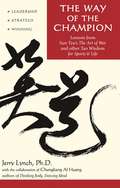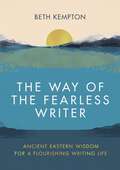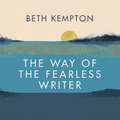- Table View
- List View
The Watchman's Rattle
by Rebecca CostaWhy can't we solve our problems anymore? Why do threats such as the Gulf oil spill, worldwide recession, terrorism, and global warming suddenly seem unstoppable? Are there limits to the kinds of problems humans can solve? Rebecca Costa confronts- and offers a solution to-these questions in her highly anticipated and game-changing book, The Watchman's Rattle. Costa pulls headline for today's news to demonstrate how accelerating complexity quickly outpaces that rate at which the human brain can develop new capabilities. With compelling evidenced based on research in the rise and fall of Mayan, Khmer, and Roman empires, Costa shows how t ht tendency to find a quick solutions- leads to frightening long term consequence: Society's ability to solve its most challenging, intractable problems becomes gridlocked, progress slows, and collapse ensues. A provocative new voice in the tradition of thought leaders Thomas Friedman, Jared Diamond and Malcolm Gladwell, Costa reveals how we can reverse the downward spiral. Part history, part social science, part biology, The Watchman's Rattle is sure to provoke, engage and incite change.
The Watershed of Modern Politics
by Francis OakleyThe concluding volume of Francis Oakley's authoritative trilogy moves on to engage the political thinkers of the later Middle Ages, Renaissance, Age of Reformation and religious wars, and the era that produced the Divine Right Theory of Kingship. Oakley's ground-breaking study probes the continuities and discontinuities between medieval and early modern modes of political thinking and dwells at length on the roots and nature of those contract theories that sought to legitimate political authority by grounding it in the consent of the governed.
The Wave in the Mind: Talks and Essays on the Writer, the Reader, and the Imagination
by Ursula K. Le GuinJoin Ursula K. Le Guin as she explores a broad array of subjects, ranging from Tolstoy, Twain, and Tolkien to women's shoes, beauty, and family life. With her customary wit, intelligence, and literary craftsmanship, she offers a diverse and highly engaging set of readings. The Wave in the Mind includes some of Le Guin's finest literary criticism, rare autobiographical writings, performance art pieces, and, most centrally, her reflections on the arts of writing and reading.
The Way Things Go: An Essay on the Matter of Second Modernism
by Aaron JaffeBuffed up to a metallic shine; loose fitting, lopsided, or kludgy; getting in the way or getting lost; collapsing in an explosion of dust caught on the warehouse CCTV. Modern things are going their own ways, and this book attempts to follow them. A course of thought about their comings and goings and cascading side effects, The Way Things Go offers a thesis demonstrated via a century-long countdown of stuff. Modernist critical theory and aesthetic method, it argues, are bound up with the inhuman fate of things as novelty becoming waste. Things are seldom at rest. Far more often they are going their own ways, entering and exiting our zones of attention, interest, and affection. Aaron Jaffe is concerned less with a humanist story of such things—offering anthropomorphizing narratives about recouping the items we use—as he is with the seemingly inscrutable, inhuman capacities of things for coarticulation and coherence. He examines the tension between this inscrutability on the one hand, and the ways things seem ready-made for understanding on the other hand, by means of exposition, thing-and-word-play, conceptual art, essayism, autopoesis, and prop comedy.Among other novelties and detritus, The Way Things Go delves into books, can openers, roller skates, fat, felt, soap, joy buzzers, hobbyhorses, felt erasers, sleds, magic rabbits, and urinals. But it stands apart from the recent flood of thing-talk, rebuking the romantic tendencies caught up in the pathetic nature of debris defining the conversation. Jaffe demonstrates that literary criticism is the one mode of analysis that can unpack the many things that, at first glance, seem so nonliterary.
The Way We Argue Now: A Study in the Cultures of Theory
by Amanda AndersonHow do the ways we argue represent a practical philosophy or a way of life? Are concepts of character and ethos pertinent to our understanding of academic debate? In this book, Amanda Anderson analyzes arguments in literary, cultural, and political theory, with special attention to the ways in which theorists understand ideals of critical distance, forms of subjective experience, and the determinants of belief and practice. Drawing on the resources of the liberal and rationalist tradition, Anderson interrogates the limits of identity politics and poststructuralism while holding to the importance of theory as a form of life. Considering high-profile trends as well as less noted patterns of argument, The Way We Argue Now addresses work in feminism, new historicism, queer theory, postcolonialism, cosmopolitanism, pragmatism, and proceduralism. The essays brought together here--lucid, precise, rigorously argued--combine pointed critique with an appreciative assessment of the productive internal contests and creative developments across these influential bodies of thought. Ultimately, The Way We Argue Now promotes a revitalized culture of argument through a richer understanding of the ways critical reason is practiced at the individual, collective, and institutional levels. Bringing to the fore the complexities of academic debate while shifting the terms by which we assess the continued influence of theory, it will appeal to readers interested in political theory, literary studies, cultural studies, gender studies, and the place of academic culture in society and politics.
The Way We Live Now: from The Age of American Unreason in a Culture of Lies (A Vintage Short)
by Susan JacobyIn this selection from her searing cultural history of the last half century, Susan Jacoby chronicles the menacing surge of anti-rationalism in contemporary American life and the degradation of public speech in presidential rhetoric, radio broadcast, television, and internet media where homogenized language and thought reinforce each other in circular fashion. At today's critical political juncture, in which boastful ignorance has infected public discourse at the highest levels of government and throughout ordinary social media, this impassioned, tough-minded work challenges Americans to face the painful truth about what the flight from intellectualism, facts, and truth have cost us as individuals and as a nation.A Vintage Shorts Selection. An ebook short.
The Way We Think: Conceptual Blending and the Mind's Hidden Complexities
by Mark Turner Gilles FauconnierIn its first two decades, much of cognitive science focused on such mental functions as memory, learning, symbolic thought, and language acquisition --the functions in which the human mind most closely resembles a computer. But humans are more than computers, and the cutting-edge research in cognitive science is increasingly focused on the more mysterious, creative aspects of the mind. The Way We Think is a landmark synthesis that exemplifies this new direction. The theory of conceptual blending is already widely known in laboratories throughout the world; this book is its definitive statement. Gilles Fauconnier and Mark Turner argue that all learning and all thinking consist of blends of metaphors based on simple bodily experiences. These blends are then themselves blended together into an increasingly rich structure that makes up our mental functioning in modern society. A child's entire development consists of learning and navigating these blends. The Way We Think shows how this blending operates; how it is affected by (and gives rise to) language, identity, and concept of category; and the rules by which we use blends to understand ideas that are new to us. The result is a bold, exciting, and accessible new view of how the mind works.
The Way of Beauty: Five Meditations for Spiritual Transformation
by François ChengFive meditations on the role of beauty in human life and its direct connection with the sacred • Looks at how beauty has the power to elevate and counterbalance the negative side of the reality facing us • Presents the role of beauty in transforming individuals and transforming the world from a Taoist perspective In a time of mindless violence and widespread ecological and natural catastrophes, François Cheng asks if talking about beauty may not seem incongruous even scandalous. Yet this is actually the most appropriate time to revisit a subject that was a philosophical mainstay for millennia. The power of beauty to elevate and transcend counterbalances the negative side of the reality facing us. As John Keats noted in “Ode on a Grecian Urn,” beauty is inseparable from truth: “Beauty is truth, truth beauty,--that is all Ye know on earth, and all ye need to know.” The ultimate human reality pivots on these two extremes of the living universe--beauty and evil. Cheng begins his teachings with the intrinsic sense of beauty revealed by the landscape, symbolized by the staggeringly beautiful Lu Mountain of his native province in China. His five meditations carry the reader from the understanding of beauty being in the mind of the beholder to its intimate relationship with the sacred, both from a Western and Taoist perspective. He shows that the most telling indication of the importance of beauty in human life and for individual spiritual realization can be grasped by simply imagining a world without it.
The Way of Ch'an: Essential Texts of the Original Tradition
by David HintonThis sweeping collection of new translations paints a brilliant picture of the development of Ch&’an (Zen) Buddhism, China&’s most radical philosophical and meditative tradition.In this landmark anthology of some two dozen translations, celebrated translator David Hinton shows how Ch'an (Japanese: Zen)—too long considered a perplexing school of Chinese Buddhism—was in truth a Buddhist-inflected form of Taoism, China's native system of spiritual philosophy. The texts in The Way of Ch&’an build from seminal Taoism through the &“Dark-Enigma Learning&” literature and on to the most important pieces from all stages of the classical Ch&’an tradition. Guided by Hinton&’s accessible introductions, readers will encounter texts and authors including: I Ching (c. 12th century BCE)Lao Tzu (c. 6th century BCEBodhidharma (active c. 500-550 CE)Sixth Patriarch Prajna-Able (Hui Neng, 638-713)Cold Mountain (Han Shan: c. 8th-9th centuries)Yellow-Bitterroot Mountain (Huang Po, d. 850)Blue-Cliff Record (c. 1040) Through this steadily deepening and transformative reading experience, readers will see the profound and intricate connections between native Chinese philosophy, Taoism, and Ch&’an. Contemporary Zen students and practitioners will never see their tradition in the same way again.
The Way of Go
by Troy AndersonFor centuries, business, political, and military leaders throughout Asia have had a secret weapon for success -- the philosophies and strategies found in an ancient game called Go. Now, Troy Anderson, an entrepreneur, knowledge management expert, Fortune 500 management consultant, and one of only five Americans to train at the Japanese Professional Go Academy, brings these philosophies and strategies to the West. Leaders and intellects such as Mao Tse-tung, Bill Gates, and John Nash (the game was featured in the movie A Beautiful Mind) as well as many CEOs and political leaders throughout Asia are among the 27 million people who have played this simple two-person board game known as the "game of geniuses." In this unique book, Troy Anderson shares the essential elements of strategy and competition that define the game of Go and shows how these principles can be applied wherever strategy is called for: How to make use of limited resources and time to produce the largest gain Which initiatives to continue and which to abandon When to lead and when to follow your opponent How to weigh competing interests among different units How to enter a market where the competition is already well established How to proceed to ensure success if the competition enters your market How to create a strategic plan when the market changes quickly How to go global but think locally Go provides experience and understanding regarding basic strategic problems that no other art, science, or field, other than war, can readily claim. In addition to an enriching account of how the game of Go has influenced Anderson's life, the valuable lessons imparted here add up to a powerful prescription for success -- whether you are seeking professional achievement, better competitive understanding, stronger personal relationships, or simply a more rewarding life.
The Way of Heart and Beauty: The Tao of Daily Life
by Deng Ming-DaoThe essential Taoist guide to living with simplicity, compassion, and integrity <P><P>This is a book that draws on ancient Chinese wisdom to explore the critical life issues: What is our place in nature? How do we make right decisions? How do we respect the earth? How are we to view life and death? What is the path we should live to truly achieve a good and meaningful life? <P><P>For Deng Ming-Dao, the two entry points for this exploration are two words: The first is the Chinese word for “heart”— which means heart, mind, intention, center, core intelligence, and soul. And the second is the word beauty—which connotes the pleasure we take in art, design, fashion, and music. Our hearts love beauty, and beauty opens our hearts. <P><P>In this profound collection of fresh and contemporary translations of ancient texts, Deng Ming-Dao gathers over 220 selections that deal with the essence of heart and beauty. <P><P>Topics include: how to be great, how long it takes to follow your heart, how to bring order to the world, how to know everything, how to pacify the heart, and much more. Here are stories, fables, poems, and epigrams that delight, inspire, and inform. <P><P>Those who would subdue people through their own “excellence” <P><P>Have yet to subdue anyone. <P><P>But if you used excellence to nurture people instead,The whole world would be subdued. <P><P>No one has become ruler of all under heaven <P><P>Without subdued hearts.It has never happened.
The Way of Imagination: Essays
by Scott Russell SandersPrize–winning essayist turns to the imagination as a spiritual guide and material method of living through climate disruption, as climate change and broad extinction forever alter our place on the planet and our lives together.Scott Russell Sanders shows how imagination, linked to compassion, can help us solve the urgent ecological and social challenges we face. While reflecting on the conditions needed for human flourishing, he tells the story of his own intellectual and moral journey from childhood religion to an adult philosophy of life. That philosophy is tested when his first wife and then their son fall ill. Compelled to leave their beloved old house, they design a new one, and then transform their vision into a home and their raw city lot into a garden.
The Way of Judo: A Portrait of Jigoro Kano and His Students
by John StevensKodokan judo, one of the most well-known martial arts in the world today, was originated by Jigoro Kano (1860-1938), a martial artist and career educator who developed the art after studying several types of jujutsu, sumo, and Western wrestling. Openness and refinement were hallmarks of his personal and professional style, and he relentlessly searched for the best way to practice, teach, and perform techniques. This biography shows how Kano saw judo as a vehicle not just for self-defense, but for physical, spiritual, and moral development as well. His teachings clearly emphasize his ideal of judo as a way of self-cultivation that leads to physical health, ethical behavior, and ultimately a better society. Kano was a tireless activist who promoted the practical application of judo's principles in all realms of life--in one's personal behavior, for education, in work, for economic benefit, and in both the local and international political arenas. Kano's students were a colorful, sometimes notorious bunch, and this book reveals how several went on to become famous--or infamous--in their own right. They include a prime minister of Japan, the leader of the Communist party in China, a famous novelist, a spy, high-level military leaders, and a media mogul, among many others.
The Way of Korean Zen
by Stephen Batchelor Martine Batchelor Kusan SunimThe power and simplicity of the Korean Zen tradition shine in this collection of teachings by a renowned modern master, translated by Martine Batchelor. Kusan Sunim provides a wealth of practical advice for students, particularly with regard to the uniquely Korean practice of hwadu, or sitting with questioning. An extensive introduction by Stephen Batchelor, author of Buddhism without Beliefs, provides both a biography of the author and a brief history of Korean Zen.
The Way of Nagomi: The Japanese Philosophy Of Finding Balance And Peace In Everything You Do
by Ken MogiFind balance and peace in every moment Life is ephemeral and ever-changing; in Japan, it’s called ukiyo—“floating world.” How can we adapt to its fluctuations without being overcome? The answer is nagomi: a philosophy of balance—and the secret to a harmonious life. Neuroscientist Ken Mogi shares wisdom from Japanese history and culture to explain how nagomi can help you: have happy relationships with loved ones who disagree engage with the natural world without diminishing its beauty strive for improvement while accepting imperfection strike a balance to achieve calm. If you’ve ever enjoyed a perfect bite of sushi—fresh fish, white rice, a hint of wasabi, maybe with a sip of sake—then you’ve already tasted what nagomi can achieve. Combining philosophy and advice, this book brings that balance into your health, work, relationships, and sense of self with nagomido—The Way of Nagomi!
The Way of Perfection: St. Teresa Of Avila (Dover Thrift Editions)
by E. Allison Peers St. Teresa AvilaThis classic of the interior life and Christian mysticism remains as fresh and inspiring today as it was 400 years ago. Written by a prominent sixteenth-century Spanish mystic and Carmelite nun, it forms a practical guide to prayer that embraces readers with its warmth and accessibility.St. Teresa of Avila's detailed directions on the achievement of spiritual perfection designate three essentials — fraternal love, detachment from material things, and true humility. She discusses a variety of maxims related to the practice of prayer and concludes with a thought-provoking commentary on the Lord's Prayer. A work of sublime mystical beauty, The Way of Perfection is above all a treatise of utter simplicity that offers lucid instruction to all seekers of a more meaningful way of life.
The Way of Ronin: Defying the Odds on Battlefields, in Business and in Life
by Tu LamFrom Special Forces veteran and internationally respected teacher of Ronin Tactics to streaming and videogame fan favorite, Tu Lam&’s memoir will captivate, astonish, exhilarate, and even profoundly resonate.Tu Lam has become known not just for his accomplishments as a decorated Green Beret, but also for his work outside the military, including: Training citizens and law enforcement professionals all over the country Providing aid to both active and retired soldiers with physical and mental health issues Co-hosting the History Channel&’s Forged in Fire: Knife or Death Appearing in and contributing to the world&’s bestselling video game, Call of Duty: Modern WarfareIn The Way of Ronin, he reveals his against-all-odds story. Tu Lam&’s resilience, dedication, and relentless pursuit of freedom saw him achieving Full Spectrum US Special Operations across twenty-seven countries worldwide for more than twenty years, only to pay the price of his own physical and mental trauma as well as addiction.That decision led him to more than two decades of grueling instruction in every facet of the special forces, then deployment to war and conflict zones—all while channeling his inner anger in secret underground no-holds-barred fighting matches. When he finally retired from the military after more than two decades, his demons caught up with him, leading to years of addiction. But even that didn&’t defeat him. Confronting his demons, he emerged triumphant. Now he shares the gripping details and riveting intricacies of this awe-inspiring journey.Tu Lam&’s life is, at times, all too real, and at many others times, almost unbelievable. For fans of Jocko Willink and David Goggins, The Way of Ronin is an ultimately triumphant autobiography of what one man can accomplish against seemingly insurmountable odds.
The Way of Science
by Dennis R. TrumbleMost people appreciate science on an obvious level. Modern medicine, electric lighting, rapid transportation, and long-distance communication are among the many benefits of science that have made life today healthier and more comfortable than people in earlier eras could have imagined. This book is about a deeper benefit of science, one that, while less obvious, may prove to be far more important in the long run: namely, the ability to look beyond our preconceptions and see the world and ourselves in a truer light. The author makes a compelling case that now more than ever the public at large needs to appreciate the critical-thinking tools that science has to offer and be educated in basic science literacy. Trumble emphasizes that the methods and facts of science are accessible to everyone, and that, contrary to popular belief, understanding science does not require extraordinary intelligence. He also notes that scientific rationality and critical thinking are not only good for our physical well-being but also are fully in sync with our highest moral codes. He illustrates the many ways in which the scientific worldview offers a profound sense of wonder, connectedness, and optimism about the human condition, an inspiring perspective that satisfies age-old spiritual aspirations. At a time of daunting environmental challenges and rampant misinformation, this provides a welcome corrective and reason to hope for the future.
The Way of Zen: 1 Cassette, 90 Minutes (Vintage Spiritual Classics Ser.)
by Alan W. WattsThe Way of Zen begins as a succinct guide through the histories of Buddhism and Taoism leading up to the development of Zen Buddhism, which drew deeply from both traditions. It then goes on to paint a broad but insightful picture of Zen as it was and is practiced, both as a religion and as an element of diverse East Asian arts and disciplines. Watts's narrative clears away the mystery while enhancing the mystique of Zen. Since the first publication of this book in 1957, Zen Buddhism has become firmly established in the West. As Zen has taken root in Western soil, it has incorporated much of the attitude and approach set forth by Watts in The Way of Zen, which remains one of the most important introductory books in Western Zen.
The Way of a Pilgrim
by Norris J. ChumleyA homeless wanderer, bearing nothing but a knapsack and Bible, sets off to follow St. Paul's advice to "pray without ceasing" in this classic of world spirituality. Written by an anonymous nineteenth-century Russian peasant, it traces his attempts to achieve a greater intimacy with God by chanting the Jesus Prayer ("Lord Jesus Christ, Son of God, have mercy on me").Generations of readers—including seekers of all faiths—began their spiritual lives by following the pilgrim's attempts to discipline his mind toward a constant awareness of God's presence as manifested through Christ's mercy. This exploration of the power of prayer offers people everywhere, in every situation, a starting place on a journey to peace, freedom, and salvation. This edition features a brand-new Foreword by Norris J. Chumley, Ph.D., an Emmy Award winning authority on religion and history.
The Way of a Pilgrim: and Other Classics of Russian Spirituality (Dover Books On Western Philosophy)
by G. P. Fedotov"A valuable treasure of Russian spirituality that theologians, philosophers, and laymen will read with pleasure and delight." — The Personalist.An anonymous nineteenth-century peasant attempts to follow St. Paul's advice to "pray without ceasing," setting out on a pilgrimage with only a Bible, a rosary, and some dried bread. Throughout his travels, he recites the Jesus prayer ("Lord Jesus Christ, have mercy on me"), an invocation reputed to instill a sense of love for all creation. The story of his spiritual education, "The Way of a Pilgrim" ranks among the classics of world spirituality, and its appearance here distinguishes this superb anthology of spiritual works by Russian writers.Clear, scholarly commentaries introduce the texts, which date from the eleventh century to modern times and derive from the lives of saints, ascetic and mystic treatises, and spiritual autobiographies. All the authors — mystics, prophets, rebels, and saints — belonged to the Russian Orthodox Church, and most occupied places of spiritual authority. Their works offer both literary sensibility and compelling examples of intense religious experience. The first such anthology in any language, this volume was hailed upon its original publication as "a gold mine indeed" (Commonweal).
The Way of the 88 Temples: Journeys on the Shikoku pilgrimage
by Robert C. SibleyCompelled to seek something more than what modern society has to offer, Robert Sibley turned to an ancient setting for help in recovering what has been lost. The Henro Michi is the oldest and most famous pilgrimage route in Japan. It consists of a circuit of eighty-eight temples around the perimeter of Shikoku, the smallest of Japan's four main islands. Every henro, or pilgrim, is said to follow in the footsteps of Kb Daishi, the ninth-century ascetic who founded the Shingon sect of Buddhism. Over the course of two months, the author walked this 1,400-kilometer route (roughly 870 miles), visiting the sacred sites and performing their prescribed rituals. As a gaijin, or foreigner, Sibley saw no pilgrim on the trail who was not Japanese. Some of the people he met became not only close companions but also ardent teachers of the language and culture. These fellow pilgrims' own stories add to the author's narrative in unexpected and powerful ways. Sibley's descriptions of the natural surroundings, the customs and etiquette, the temples and guesthouses will inspire any reader who has longed to escape the confines of everyday life and to embrace the emotional, psychological, and spiritual dimensions of a pilgrimage.
The Way of the Champion: Lessons from Sun Tzu's the Art of War and Other Tao Wisdom for Sports & Life
by Chungliang Al Huang Jerry LynchMartial artists, great warriors, coaches, generals, and successful corporate CEOs have all effectively used the strategies for winning found in Sun Tzu's Art of War.<P><P>Authors Jerry Lynch and Chungliang Al Huang, using lessons from the The Art of War, as well as other ancient Taoist books such as the I Ching and Tao Te Ching, teach readers to develop the capacities and qualities that make a champion-such as high self-esteem, courage, fortitude, determination, perseverance, tenacity, self-awareness, integrity, the ability to take risks, and the ability to learn from failure.The emphasis on self-awareness, tactical positioning, and strategic advantage means that practitioners win through inner growth and self-improvement-giving them a universal competitive edge.
The Way of the Fearless Writer: Ancient Eastern wisdom for a flourishing writing life
by Beth KemptonA revolutionary approach to writing inspired by ancient Eastern wisdom, from the bestselling author of Wabi SabiJoin author and Japanologist Beth Kempton on a sacred journey to uncover the secrets of fearless writing which have lain buried in Eastern philosophy for two thousand years.In a radical departure from standard advice and widely-held assumptions about the effort and suffering required for creative success, The Way of the Fearless Writer will show you there is another way to thrive - a path of trust, ease, freedom and joy.Learn how to free your mind so your body can create, transform your relationship with fear, dissolve self-doubt, shift writer's block, access your true voice and bravely share your words with the world.This profound book reveals the deep connections between mind, body, spirit, breath and words. Offering a rare insight into the writing life and a host of fresh and original exercises, it will open your eyes to writing as a direct connection to life itself.Welcome to The Way of the Fearless Writer.
The Way of the Fearless Writer: Ancient Eastern wisdom for a flourishing writing life
by Beth KemptonA revolutionary approach to writing inspired by ancient Eastern wisdom, from the bestselling author of Wabi SabiJoin author and Japanologist Beth Kempton on a sacred journey to uncover the secrets of fearless writing which have lain buried in Eastern philosophy for two thousand years.In a radical departure from standard advice and widely-held assumptions about the effort and suffering required for creative success, The Way of the Fearless Writer will show you there is another way to thrive - a path of trust, ease, freedom and joy.Learn how to free your mind so your body can create, transform your relationship with fear, dissolve self-doubt, shift writer's block, access your true voice and bravely share your words with the world.This profound book reveals the deep connections between mind, body, spirit, breath and words. Offering a rare insight into the writing life and a host of fresh and original exercises, it will open your eyes to writing as a direct connection to life itself.Welcome to The Way of the Fearless Writer.
